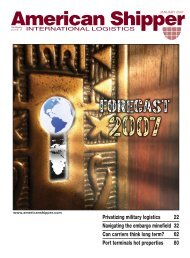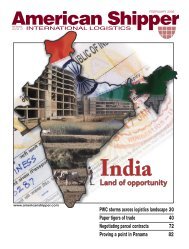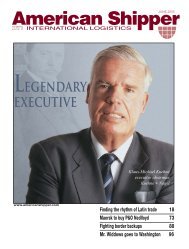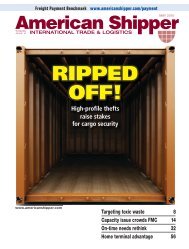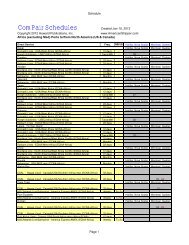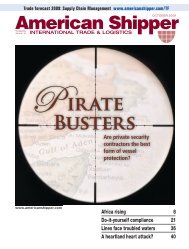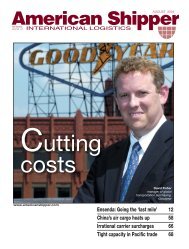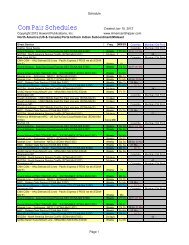TRANSPORT / PORTSEller’s suit and tentatively approved thecontract between P&O and DP World. OnMarch 6, the court declined to hear an appealby Eller, clearing the way for the dealto be finalized two days later.On March 8, the House AppropriationsCommittee sent a resounding message toPresident Bush, voting 62-2 to block thedeal. The bill was attached to an emergencyspending bill for Iraq military efforts andKatrina recovery to make it politically difficultfor Bush to veto.Business groups were slow to rise to thedefense of the Dubai Ports World deal. OnMarch 9, the U.S. Council for InternationalBusiness and the U.S. Chamber of Commerceasked Congress to give the administrationtime to complete its security reviewso that foreign investors are not spooked bya perception that the investment process hasbeen politicized.By then, it was too late. Sen. John Warner,R-Va., one of the few legislators whosupported the transaction, went to the floorof the Senate March 9 to read a statementfrom DP World that it was throwing in thetowel and divesting its interest in the U.S.port properties.“DP World will transfer fully the U.S.operations of P&O Ports North America Inc.to a United States entity,” the statement said.“This decision is based on an understandingthat DP World will have time to effect thetransfer in an orderly fashion and that DPWorld will not suffer economic loss.”But the story did not end there. DP Worldwas vague about whether it would actuallysell the U.S. business to an <strong>American</strong>company, or whether the U.S. governmentwould have to make DP World whole. It alsodidn’t rule out the possibility of owning aU.S.-managed and based company.In fact, P&O Ports North America hadoperated as a U.S. subsidiary, with a separateboard of directors, and DP World hadalways stated it intended to maintain thesame structure.“I assumed they would manage us likethe old owners,” P&O’s Scavone said. TheNorth <strong>American</strong> subsidiary, based in NewJersey, handled day-to-day operations andsent its reports and requests for capital to theLondon headquarters. In turn it benefitedfrom centralized resources in areas suchas information technology, payroll and accountingand security expertise.“That’s the way an international terminalcompany works. It was always my understandingthat was never going to change,”Scavone said.Many observers interpreted DP World’saction as an effort to remove itself as apolitical lightning rod while still trying toretain its rights as a passive investor.82 AMERICAN SHIPPER: APRIL 2006On March 15, DP World cleared up some ofthe suspense and said it plans to sell the U.S.facilities within four to six months to an “unrelatedU.S. buyer.” The company’s financialadvisor, Deutsche Bank, is running a formalprocess to solicit and evaluate bids.Still unclear, however, is whether the U.S.government will be the buyer of last resortor help finance a deal. DP World has saidany sale must ensure that it doesn’t losemoney from its recent transaction. Companyofficials and analysts have placed the valueThe mainstream press andCongress gradually learnedthrough the Dubai PortsWorld political drama that foreigncompanies control operations in about 75percent of U.S. port terminals, and thatsome of those companies are actuallyowned by foreign governments, suchas Singapore, China and Taiwan.That led to several pieces of legislationto restrict foreign ownershipof port facilities and other types ofinfrastructure.The only significant <strong>American</strong> terminaloperators are Seattle-based SSA Marine,Maher Terminals at the Port of New Jersey,and Marine Terminals Corp. on the WestCoast. CSX Corp., which owns a major U.S.railroad, sold its marine terminals in China,Germany, Australia and South America to DPWorld for $1.1 billion in early 2005. It did notown terminals in the United States.Democratic Sens. Hillary Clinton of NewYork and Robert Menendez of New Jersey,who represent the Portof New York-New Jersey,introduced a billto prohibit companiesowned or controlled byforeign governmentsfrom purchasing portoperations. The billincludes a provisionrequiring the executiveSurprise! U.S. portsare foreign-ownedIt was news to Congress, and Capitol Hill is respondingwith efforts to end foreign ownership of U.S. infrastructure.Clintonbranch to conduct a study on existing foreigngovernment-owned companies operating inU.S. ports, and makes recommendations toCongress on how to handle any resultingnational security risks within 30 days.“We wouldn’t turn the border patrol or theof P&O Ports North America at about $700million, based on the sale price of the parentcompany and the fact that U.S. operationsonly accounted for about 6 to 10 percent ofits profits. It is unclear if other bidders willreadily accept the 20 percent premium analystssay DP World paid to win the bid.As for Eller, a British High Court saidit will have to pay P&O’s court costs forbringing a nuisance suit without foundation.P&O officials said their legal bill totaled$400,000 to $500,000.customs service over to a foreign government,and we can’t afford to turn our ports over toone either,” Menendez said in a statement.A bill introduced by Sen. Frank Lautenberg,D-N.J., sought to give portauthorities the power to protectthemselves by terminatingany lease when they canshow that transfer of terminalownership wouldaffect the security of theport. It would also requirethe Department HomelandSecurity to review any change inownership of a terminal operator for securityproblems.In the House, Rep. Duncan Hunter, R-Calif., authored a bill that would go evenfurther and require foreign companies thatown infrastructure such as airports, powerplants, tunnels, and terminals to sell it to an<strong>American</strong> company if the Defense Departmentdetermines it is critical to nationalsecurity. The company would have to be 51percent U.S.-owned and have its chairman,chief executive and other top executives be<strong>American</strong> citizens.Such a law, if passed, could bring additionalscrutiny to companies such as Suez, aFrench company that owns plants in 17 statesthat provides drinking water to 7 million<strong>American</strong>s, and CITGO, which is controlledby the government of Venezuela and its anti-<strong>American</strong> dictator, Hugo Chavez. CITGO hasterminals and refineries in several states.Many of these bills moved forward in Congresseven after Dubai Ports World announcedits intention to divest its U.S. assets.But several authorities on national securitybelieve the United States already has
sufficient controls in place to make sureforeign companies comply with U.S. nationalinterests, or could have corrected the law torequire stricter standards without blockingthe sale of the U.S. terminal operations ofPeninsular and Oriental (P&O) Steam NavigationCo. to United Arab Emirates-ownedDubai Ports World.DP World early on said it intended to createa legal U.S. subsidiary to do business inthe United States, and the government couldhave insisted that the board be comprised of<strong>American</strong>s who have security clearances, saidHarlan Ullman, a senior advisor on nationalsecurity affairs at the Center for Strategic andInternational Studies in Washington.“They may own the company, but theydon’t exercise complete leadership” under ascenario that makes them passive investors,Ullman said. And if serious problems arose,“we could nationalize it.”Similar concerns were raised severalyears ago when Hong Kong-based HutchisonWhampoa, a giant conglomerate withholdings in telecommunications, real estate,hotels and port operations, sought to openterminals along the Panama Canal. HutchisonPort Holdings is the largest port operatorin the world, and operates terminals on bothsides of the Panama Canal.“People were saying (the canal) will bedominated by mainland China. That wasnonsensical because this was the capitalistof all capitalists,” Ullman said of HutchisonChairman Li Ka-shing. “There was noway he was going to be the cat’s paw” anddisrupt trade.“Plus, the Chinese are as dependent ontrade as we are. The problem was more of aninvention than a reality,” Ullman said.There are also other precedents for foreigncompanies operating in areas in whichthe United States has national securityinterests.Maersk Line, a Danish vessel operator,acquired Sea-Land Services in the late 1990sand formed a North <strong>American</strong> subsidiaryso it could comply with U.S.-flag requirementsfor chartering cargo ships to the U.S.military. Maersk is now the largest providerof commercial vessel transport and relatedservices to the military under the MaritimeSecurity Program.The U.S.-flag requirements were institutedwhen the U.S. maritime fleet began todisappear in the 1970s and 1980s becauseU.S. regulations and wages made it too hardto compete with foreign operators. Theflag requirements were more of an effortto protect <strong>American</strong> industry than nationalsecurity, industry experts agree.Reform. The Dubai ports controversyalso created momentum to reform two areasof public policy, port security and foreigninvestment, that many claim have not receivedadequate attention in the post-Sept.11, 2001 era.Congressional critics said the securityquestions surrounding the deal should haveautomatically triggered a longer investigationthan the 30-day staff review conductedby the Treasury-led interagency groupknown as the Committee on Foreign Investmentin the United States (CFIUS).The president has the authority to prohibitany acquisition that could harm the nation’ssecurity. In 1988 Congress passed the Exon-Florio amendment delegating to CFIUS thetask of investigating foreign acquisitionsof U.S. companies to make sure they don’tendanger national security.Sens. Clinton and Carl Levin, D-Mich., insistedduring a hearingthat the law mandatesa 45-day investigationwhen the acquiringcompany is a foreigngovernment and thesale could impact nationalsecurity. Thatextra requirement wasadded in 1992 in re-Levinaction to the proposed sale of a missilemanufacturer to Thomson-CSF, the <strong>American</strong>subsidiary of a French firm that was then 58-percent owned by the French government.Deputy Treasury Secretary RobertKimmitt said successive Clinton and Bushadministrations have interpreted the law tomean that an agency has to register a nationalsecurity concern before it goes to a 45-dayinvestigation, and that any initial concernswere quickly addressed to the satisfaction ofall agencies. DP World received a clean billof health from the intelligence communityand unanimous approval by the assistantsecretaries on the panel.Coast Guard Memo. The administration’sposition appeared to be underminedwhen Sen. Susan Collins, chairman of theHomeland Security and Governmental AffairsCommittee, produced an internal CoastGuard memo stating that intelligence gapsprevented an analysis unit from fully assessingwhether the sale of terminal operatingrights to DP World posed a security threat.Homeland Security officials said theunclassified excerpt from a classified documentwas taken out of context, because itwas part of normal internal deliberationsto address questions that ultimately led theagency to sign off on the deal.Top DHS officials admitted they hadnever seen the memo before.Opponents of DP World’s investmentpounced on the new revelation as evidenceTRANSPORT / PORTSthat the administration did not thoroughlyexamine its national security implications.In fact, few foreign acquisitions have ledto full investigations. Since 1988, CFIUShas only opened investigations into 25 ofthe 1,604 transactions it reviewed. Twelve ofthose cases were sent to the president for adecision and only one deal was ever blocked.In many cases, companies have modified theirpurchase agreements to meet U.S. requirements,or dropped out of the deal when theywere unable to meet U.S. requirements.CFIUS reviewed 65 cases in 2005.Administration officials insisted that theirreview of DP World was not hasty. AlthoughDP World filed its formal application onDec.16 and CFIUS approved it one monthlater, officials said the sale was actually underreview for 90 days as a result of informal consultations.DP World was given extra scrutinybecause it is a state-owned company, theysaid, but also was a known quantity becausethe Department of Homeland Security hasestablished relations with Dubai Customs,the port authority and the company to implementU.S. cargo security programs. In fact,CFIUS had previously reviewed DP Worldbefore it acquired CSX World Terminals fromJacksonville, Fla.-based railroad companyCSX Corp. in January 2005.Members of Congress accused the administrationof approving a sale that shouldhave raised red flags without consulting withCongress. After the president’s claims aboutAl Qaeda connections and weapons of massdestruction in Iraq were discredited, andpromises that the government was preparedfor Hurricane Katrina last summer turned outnot to be true, lawmakers were no longer willingto trust the administration’s assurancesabout the sale at face value and demandedmore openness in the CFIUS process sothey could evaluate whether DP World wasin fact a trustworthy company. Members ofCongress were upset that the administrationdid not reveal any of the reasoning behindits decision in favor of DP World.Administration officials insisted that theywere just following confidentiality provisionsestablished to protect sensitive financial, securityand proprietary corporate information,and that under normal practice Congress isnotified of approvals after the fact. To preventpublic disclosure of information, CFIUSdoes not share information with Congressunless requested to do so, and then in limitedfashion. Many of the firewalls were put inplace by legislation and regulatory practiceto remove politics from the approval process.The Exon-Florio amendment specificallygave the president maximum control anddiscretion in determining whether to slowor block foreign investment.The lack of advance consultations ledAMERICAN SHIPPER: APRIL 2006 83



